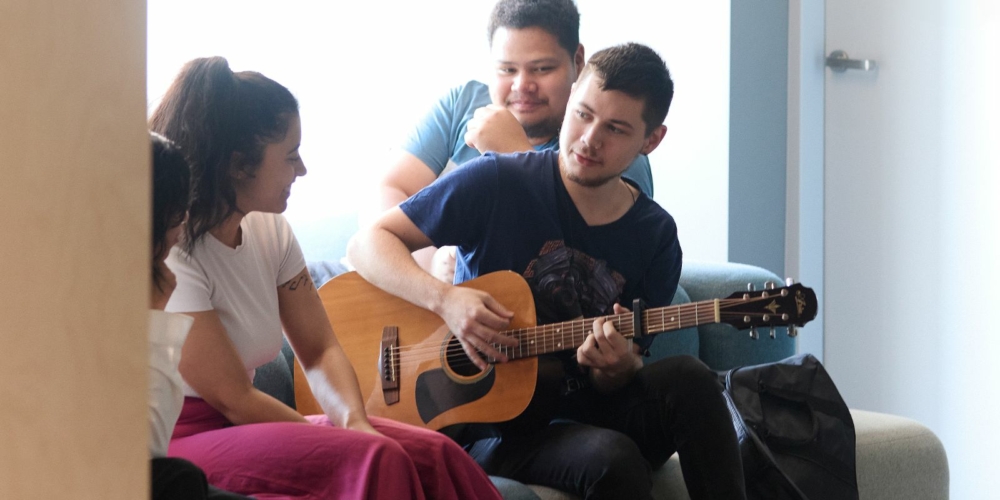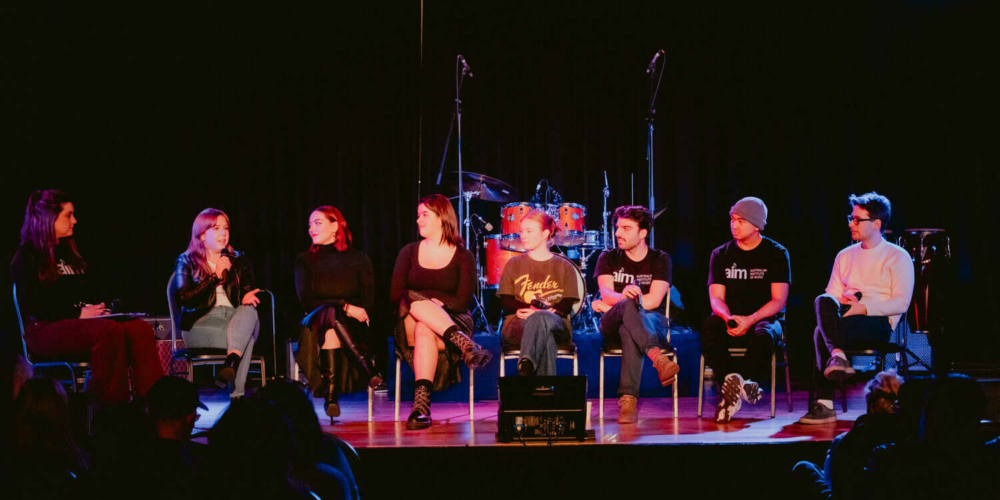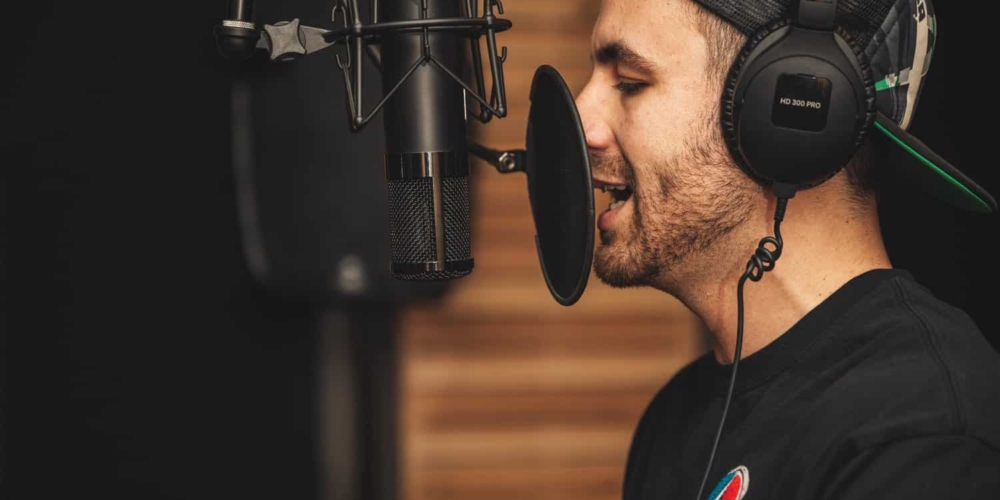Ganesh Singaram is a lauded recording and mixing engineer and music producer with 14 years of experience working with high-profile artists in leading studios around the world. On Thursday March 4th, Ganesh is teaching engineering, producing and mixing masterclasses at the Australian Institute of Music in Sydney.
Ganesh Singaram has worked with a slew of Grammy Award-winning artists including N.E.R.D, Kanye West, INXS, Brandon Flowers (The Killers), Rob Thomas (Matchbox 20) and Trey Songs. He’s refined his techniques working with in-demand producers like Richard Lush (The Beatles), Alan Moulder (Nine Inch Nails, Smashing Pumpkins), Nick DiDia (Pearl Jam, Bruce Springsteen, Stone Temple Pilots, Powderfinger) and ARIA Award winning engineer/producer Paul McKercher (Josh Pyke, Sarah Blasko, Pete Murray). We caught up with him for some advice and stories from the world of audio engineering.
ADVICE FOR YOUNG ENGINEERS
What advice would you give to young audio producers / engineers looking to break into the business?
Ganesh: Some advice I would give for people serious about getting in the game:
- Spend time on developing your craft.
- Surround yourself and network with others who can drive you further.
- Always take initiative to show your dedication to what you’re doing.
- People notice your work when you give it 110%. Don’t record a vocalist and sit on your phone during takes.
What do you think drives artists to choose producers or engineers – a signature sound or delivering something unique every time? How do you balance developing these things in the studio?
Ganesh: I personally think artists choose their engineers by the quality of work they do as a whole. I think the key questions they consider include: are they easy to work with? Do they take pride in their work? Do they have attention to detail and can they help me create my vision of the song to send a message I’m trying to convey to the listener?
Developing your own style and sound comes with time but you have to start somewhere. I started off with what I learnt from studying and used this as a foundation to then add experience and knowledge from various people I’ve worked with to create my own style and sound.
Working in a studio was great for me as I rose through the ranks from an intern to assistant engineer to head engineer to owning my own studio to then travelling the world doing what I love. As you work with various talents you pick up things along the way to incorporate into your work style and sound.
“I think the most significant change in technology in the last 5 years is the ability to create music anywhere and at any time.”
– GANESH SINGARAM, ENGINEER & PRODUCER
I always use each moment as a learning curve whether I agree with what is being done or not. I keep an open mind so I can take the ideology and intent of what they are trying to achieve and utilise that in my own development.
There’s always something to learn from a situation or an encounter. I feel if you don’t think there is, it will stop you from exploring other sides and ideas that might not be possible if you had decided not to be open to it.
I would use an example such as travelling. When you can travel and experience another culture and lifestyle, you can have a real appreciation and understanding of how others live. There’s a certain learning and understanding you can gain and take away when you open yourself up to exploring any scenario.
HOW TECH HAS TRANSFORMED MAKING MUSIC
What do you think is the most significant technological development in the last 5 years for engineers and producers?
Ganesh: I think the most significant change in technology in the last 5 years is the ability to create music anywhere and at any time.
Our creativity now has no bounds. All you need is a computer and creativity to produce anything you want. Our ability to create music anywhere and access opportunities to share this with people all over the world through various music, video and social platforms has changed everything. This enables us as music creators and lovers to have access to listeners we wouldn’t have had an easy opportunity to expose our music to ten years ago.
It’s a really exciting time as there is so much information, support and knowledge to grasp from the internet that you can begin to formulate a plan of attack to make music and make it a career.
WHAT ALL AUDIO ENGINEERS SHARE
What are the personal qualities that all great engineers, producers and mixers have?
Ganesh: I think the most important quality that makes you a great engineer, producer and mixer is yourself. What you bring to the table to be creative, being easy to work with, working hard and to bring out the best in what you are doing are the most attractive attribute to have when someone decides to share their musical journey/vision with you.
I have a good work ethic where if I work with someone, my aim is not to input my ego to the music but rather see what the artist is trying to capture and use all the tricks I’ve gained along my journey to make it happen. It can be as simple as making an artist feel comfortable and asking them if they would like a tea to utilise my technical and creative skills to provide a sound that they might not have thought or experienced.
LESSONS FROM WORLD-CLASS PRODUCERS
What were the most important things you learned from producers you’ve worked with?
Ganesh: I’ve been very fortunate enough to work with so many talented people from my travels and to learn so many things to incorporate into my own style.
Whilst working with such people as what you have mentioned – I’ve learnt the technical side, the creative side, working with an artist and the importance of various studio practices to create driven results.
A few examples of great producers I’ve learned from:
Alan Moulder (Nine Inch Nails, The Killers, Smashing Pumpkins, Queens of the Stone Age and more): One particular thing I learned was about the creative side of mixing and how to create more of a sonic landscape to bring the listener on a journey. I learnt to push what I thought to be a safe place through to a space of creation without limitations.
Richard Lush (The Beatles): Richard was a very funny story. This was my first assistant engineering session ever where I had to be in a studio where I didn’t know the room. I was straight out of college.
It was very intimidating as it was a huge session with drums, bass, piano, strings, horns, guitars and various singers. I was so over my head and nervous it wasn’t funny. I had to deliver and show my eagerness as this was my test run to land a gig as a studio assistant. The owner of the studio, Phil Punch (who owned Electric Avenue Studios) asked Richard at the end of the session: “How did he do? Should I give him a job?” Richard replied “I think he’s good. Give him a shot, he’s got a great attitude and the right stuff to go far.”
It was such an amazing time for me as Richard is so incredible at what he does. I learnt loads from this session, like how to work in a high-pressure environment to deliver results. More importantly, I learned about how important microphone placement is! Richard showed me how to use a microphone to capture a sound without any processing and still sound amazing.
Nick Didia (Powderfinger, Bruce Springsteen, Pearl Jam, Rage Against The Machine and more): I learned the importance of a rough mix and making sure that everything that is ever sent to anyone is the best you can make. I always thought a rough mix that sounds like the recording is good enough for the artist to take home. What I realised after working with Nick is you need to smash everything out to the best of your ability. His rough mixes sounded like full-blown mixes and what I took away from that is if you give it your all with every mix, anyone who hears that can get a feel of the song but also know the calibre of work you can do. The question becomes: What can they do with a proper mix if there was time?
Paul McKercher (5-time ARIA Award Winning Engineer and Producer): He truly was a great mentor for me and I’ve learned loads from all our sessions together. I’ve worked with Paul on so many records whilst working at Electric Avenue as an assistant engineer.
He showed me a technical insight into engineering I’ve never experienced before. This included microphone techniques, using a compressor, working on an analogue tape machine, EQ, the importance of a headphone mix and critical listening. I remember working with Paul and using the biggest patch bay I’ve ever worked with at the time. I kept messing it up and felt I was letting down the session. Paul took the time and explained things to me as I was in over my head. When we finished the session I came in the next day and practiced so hard on the patch bay for days and weeks. I eventually learned it to a point where I couldn’t get stumped anymore. That process made me understand signal flow and troubleshooting to another level.
You’ve worked with some very unusual individuals (e.g. Kanye West). Whats the most important thing you’ve learned in handling artists?
I’ve learned that you always get nervous on a session, whether you’re working with international superstars like Kanye West or Pharrell or even a new artist for the first time in the studio.
I think there is always going to be an element of nerves to any session. The best piece of advice I can provide is to ensure you are prepared. Do your prep work and get ready for the session, be yourself and be willing to go above and beyond to make the session work. I do get starstruck, I’ve been listening to their music for a long time and to see them walk in was something almost surreal. Once you get past that you have a job to do.
You need to think a few steps ahead so you keep the creativity moving forward rather than holding it up. For example, if someone was talking about adding percussion in for a part, I’m already out there setting up a mic and patching the signal path with a headphone mix even before they say let’s record this. That sort of initiative and being present with the session really pays off as people notice these attributes. It ensures you stand out from some of the others.
SURPRISES ABOUT STUDIO LIFE
What would people be surprised about the life of a studio professional?
Ganesh: I think people would be surprised at the standard working hours and demands in a studio to excel in your field. It’s loads of work and not always glamorous but what you take from those amazing sessions really validates why we have chosen such a hard but inspirational industry to work in. Music can impact so many.
Ganesh Singaram’s Masterclass is at AIM Sydney on Thursday March 4th. AIM Students can visit AIM Home for more details.




